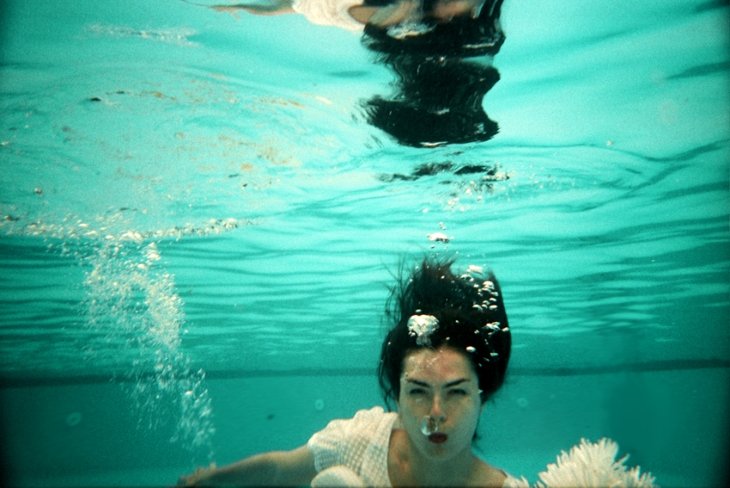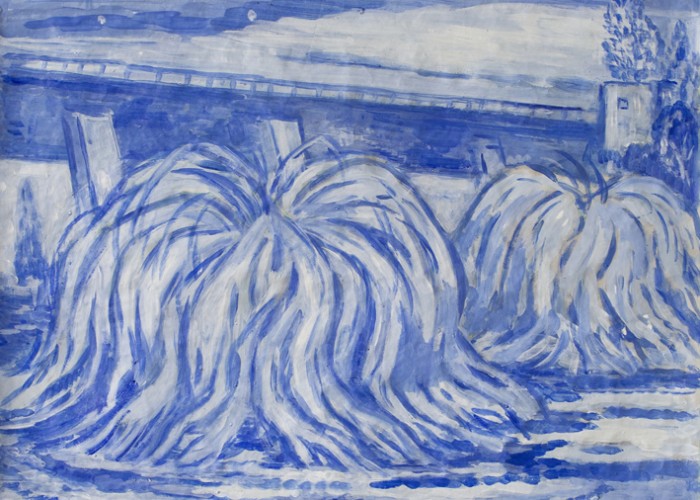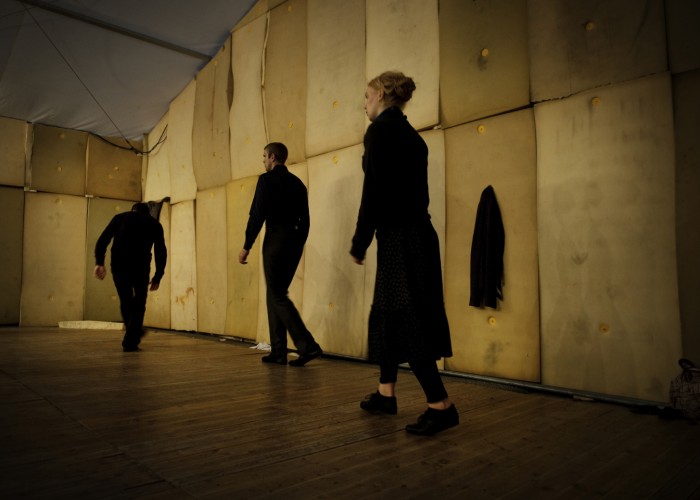The Birthday Card
Dorothy Spears
An impotent man on vacation, so potent at work, keeps going at his wife every night, every afternoon. “I need to prove that I’m norm…I mean, that I’m all right,” he whispers, with coiled desperation.
The wife buries her face into a synthetic pillowcase, recalling a discussion they’d had a decade ago about a birthday card from George. He’d accused her of trying to ruin him, citing her need to discuss the birthday card as an attempt to undermine his confidence. It was only a few months after their wedding; he’d picked up her favorite wedding gift, a Navajo bowl, and smashed it against the oak floor of their apartment.
Today, after breakfast, and another failed attempt, she goes for a solitary bike ride. Down the road the workmen wave and grunt “Salaut.” They are splitting boulders into more manageable fragments, laying stones for a new wall.
With the exception of one, who has thick, dark hair and a sturdy build, the workmen wave again later, when the four of them are all together, a regular family, and the father is teaching the older boy to ride a two-wheeler. The younger one struggles to ride on training wheels. Whenever a vehicle approaches them on the flat horizon, his fear takes the form of wide-eyed paralysis, and his bike topples in the middle of the road, or, forgetting to apply his handbrakes—for it’s all too much to learn, and at three, he’s in such a hurry to keep up with his older brother—he crashes against a wall, or hurtles off the jagged edge of asphalt into a roadside ditch.
The cute workman scratches his neck, and silently returns to his stone splitting. The sun glistens on his skin. Her husband notices him, too. He starts calling him “the cute one.” He comes up with the idea when he’s jogging. He’ll pay the cute one to sleep with her. The idea arouses him. He shows her how hard he is, and starts groping at her panties.
The landscape is scorched, the fig leaves curled. Branches of eucalyptus click in the hot wind. Signs are in German. The essence of the island retreats. Olives wither on wizened branches, giving up, finally, after what has seemed an endless, centuries old struggle, to produce; to be productive.
The husband has been telling their older son about the various Greek myths. A few days ago there was Prometheus, to whom the husband often compared himself, who gets tied to the rock so his liver can be devoured by birds. Today, at lunch, he has hit upon Tantalus, who apparently, by some punishment of the gods, was refused the pleasures of fruit and water. Every time Tantalus reaches a little higher for a fruit, its branch withdraws just beyond his grasp. Likewise, when he lowers his head to drink, the water retreats from his eager lips.
As the husband recounts the Tantalus myth, it reminds her for some reason of George, his uncle. She imagines George with her husband when he is still a little boy, recounting the story of Tantalus. Perhaps it’s a way for George to address his own frustration at not being able to sample the fruits, so to speak, offered by his beautiful young nephew. She remembers her husband once telling her that George, his mother’s older—and far more exotic—brother, had seemed so fascinating to him and his sisters when they were kids; George told the best stories. She imagines the myth of Tantalus as George’s way of chiding her husband for being so tempting, while at the same time, so taboo.
The photograph on George’s birthday card, still vivid in her mind, depicted a greased up, muscle-bound man wearing a red string bikini. A big red heart obscured his crotch. Happy Birthday to someone whose heart is matched only by the size of his… read the front. The message inside, scribbled by dear uncle George: Take it from one who knows!!!
She’d torn the card up; her husband had slapped her.
The husband’s discussion of Tantalus leads to a discussion of tragedy, in general. She gathers the lunch plates and plunges them into a ceramic bowl filled with sudsy water. Her older son touches his puffy lip. “Is this a tragedy?” he asks.
The husband gives her a desperate look, as if his own tragedy is enough.
She frowns and scrubs a knife.
The day before, biting into a peach pit, her older son screamed in agony. His baby teeth had been slow to fall out; she’d suspected his pain had something to do with a loose tooth. But when she looked in his mouth, his whole upper gum was red and puffy. She’d driven him to a dentist in the port. The gum above his front tooth was abscessed. The infection had spread into his lip. She was amazed—and frightened—by the gravity of the situation, and the fact that she’d failed to detect it earlier. The dentist lanced the abscess, to drain the puss and blood, while her older son lay shrieking in his cushioned chair.
She tells the older son now, in no uncertain terms: “No. An abscessed tooth is not a tragedy. It just hurts, is all.” She reminds him that the antibiotics prescribed by the dentist seemed already to be kicking in; he has just eaten a baguette.
On one of their bike rides the mother and her sons have met a woman her age, Margalida, who lives nearby on her father’s farm. The mother tells everyone something Margalida has told her, that her mother died in childbirth with her.
“That’s a tragedy,” the mother says.
“Who’s Margalida? What farm?” asks the husband.
Their sons both ignore him. They already know from riding with their mother, that Margalida’s father owns the farm with the turkey. They hold their heads in their hands, lamenting the fate of growing up without a mother.
“That’s just terrible,” her older son declares. “We need our moms.”
“Her mom isn’t dead,” says the younger one, who tends to see the bright side of things.
“Oh, no?” she says.
“No.” He is shaking his head, vehemently. “She’s just working.”
“Really?” the mother says, smiling. “What’s she working on?”
The younger one mumbles something that sounds like “surviving.” But surviving doesn’t seem like a word he’d know. “What?” she asks.
“Keeping alive,” he hisses, indignantly.
A few days later, he says, “Mommy, don’t be dead.” And she promises him that she won’t be.
The husband is so fixed upon the sexual issue that it’s become impossible for her to derive pleasure from even the simplest things. The view out the window, for example, as she lies in a pool of sunlight, applying moisturizer to her legs. The horse nudging apricots from a tree across the street, then lunging at the swarming pigs, so he can devour all of the apricots himself. The stooped old women gathering tomatoes in their aprons. The goats and sheep pressed up against walls, or baying from the umbrella-like shade of fig, olive and almond trees.
The steady sound of picks on stones.
The cute one has retreated with a wheelbarrow behind the neighbor’s house to mix cement. He watches her through a row of young cypresses. She dives into the pool and begins swimming laps. Back and forth she strokes, without lifting her face from the water. She emerges from the pool, gasping. Water drips from her body. She plunges her face into a scratchy towel—the linens at this place are crap—and collapses onto a plastic chair. The washed-out light of midday succumbs to the pinkish tint of afternoon on the faces of the Tramuntanya. In the dry breeze shells broken from some sort of small nut drop from the scraggly eucalyptus. She recalls the prickly pear, all of those little bristles she couldn’t get out. She feels used, she realizes. Her husband is using her to convince himself everything is fine. The truth is, it’s never been fine, not really.
One morning, Margalida, picks them up in her little red car and drives them to her favorite beach, the Platja Muro. She has brought another friend, Antonya, a woman in her forties.
“I have a feeling as strong as floor cleaner that the waves are going to be big!” cries her older son, ecstatically, from beside her on the back seat.
She only knows a few words of Mallorquin, but even in Castilian, she struggles with the translation for floor cleaner. Eventually she gets her point across. In the rearview mirror, Margalida smiles.
The waves at the Platja Muro are gentle. Lunging through the waist-high water along the shoreline, her younger son’s arms extend in an embrace that looks wide enough for all of them. “If the water is ice cream, then we can lick it!” he says, wiggling his pink tongue at her.
“What did he say?” asks Margalida. She’s picked up on the ferocity of this younger one, whom she pokes and plays with and swings in circles.
Antonya goes to look for seashells, and as the boys build a sandcastle, Margalida quietly explains that Antonya, once a distinguished psychology professor at the university in Palma, was also a rather famous lesbian. Following the abandonment of her lover four years earlier, Antonya has suffered total hearing loss. Since then she’s also suffered from migraines. A prominent gay rights activist, she’s been unable to work. Margalida says that apart from helping on her father’s farm, she, too, has been unable to find a decent job. The island’s economy, apparently, isn’t contingent upon a psychology degree, or even, for that matter, a college education. Margalida could move to the mainland. But she says she doesn’t have the heart to leave her father.
Actually, Margalida corrects herself, Antonya can hear, but what she hears is awful–the screeching grind of heavy machinery. Margalida imitates the sound of jackhammer. “EH-EH-EH-EH!—It’s really intolerable,” she adds, shrugging and frowning.
“EH-EH-EH-EH-EH!” her new friend repeats.
They exchange a sober look. Then, rather absurdly, they burst out laughing.
“No, but in all seriousness, it’s torture,” says Margalida, finally gaining control of herself. She explains that Antonya has recently been discharged from a psychiatric hospital, after an attempt to slit her wrists. No one has been able to determine the cause of her suffering.
“It’s a tragedy,” her new friend agrees. She is watching her older son navigate the softly curling waves, hoping the salt water will soothe his infection.
“A tragedy,” repeats Margalida.
“A tragedy, yes. Tragedia, that’s the word. Isn’t it?”
They look at each other again. Margalida shrugs.
Back at the house, the husband is crying. “If it doesn’t stop soon,” he says, his voice drifting off. He begins to punch his body. It looks as if his fist is hitting his groin. She’s terrified.
“Stop!” she screams. She lays a cool wet towel on his back to calm him, and sits beside him on the bed. He sobs into the horsehair mattress.
She walks over to the dresser, where a wooden rosary dangles from the small mirror. As she unhooks it, she sees it is accompanied by a message in Mallorquin, requesting prayers for a deceased relative seeking release from purgatory.
“Say it’s a little better,” he pleads. “It was, a little. Wasn’t it?”
But now she’s angry. Of course it was better for him, she says. He came. But for her it was awful, his fist shoved like a stone between their bodies, as if to support his flimsy penis. His $20,000 watch scratching against her pelvis. “Why did you keep your hand there?” she cries. “Why didn’t you just let go? And that stupid watch always scratching up against me. No, it wasn’t better. I couldn’t even fucking feel you.”
The bedroom door opens. Her older son is backlit.
“Mommy, what do you think is the speed of seeing?” he asks, hovering in the doorway, as if afraid to enter. Her younger son peers in, his finger in his mouth.
In court, arguing his high-profile cases, her husband is the picture of accomplishment. There was, for example, a trial earlier that year involving an Internet predator, a 25-year-old man in a teenage chat room, who through flattery and promised gifts, arranged to meet and murder a thirteen-year-old girl. Her husband was persuasive, his face slightly flushed, his watch flashing with each emphatic gesture. “This is what we must address in this new age of the Internet,” he told the jury. “This could happen to your son, your daughter.” What he didn’t say, which he also knew was true, is that is that the predator can be someone you love, someone you’ve grown up with, someone you continue to see at Christmas. That the predator may still regularly call you at work and send you letters plump with newspaper clippings relating to everything that reminds him of you, (which is a lot). That the predator is, essentially, part of you.
Consulting his coveted watch, a gift from George, naturally, her husband informed the jury, “Right now, 85% of teenaged girls approached by an anonymous visitors to chat rooms eventually agree to meet those anonymous visitors. Our laws need to reflect these changing times. We need to protect our children.” He won the case. This particular sexual offender was banished. George, on the other hand, will clink glasses with him at his parents’ Labor Day party when they are home again next weekend.
She wants to send him to a prostitute. He can practice on someone else. He threatens to jump from a high rock at Deya.
On the last days of their vacation the workmen’s cheerful chorus of picks gives way to chainsaws and—worse—jackhammers. The noise is unbearable. The wife looks through her guidebooks and begins obsessively plotting day trips, far from the thunderous roar, of their rented house. to the remote lighthouse in Fomentor, where they hike around for an hour, eat lunch in a little café, and grab ice cream in the port on the drive back, or to the lush the Moorish Jardins d’Alfabia, stopping for lunch in one of the pretty rose-arbored restaurants of Valdemossa, followed by a visit to the chapel where George Sand and Chopin once spent the winter, and the purchase of horchatas—a local iced drink with crushed almonds and milk. But another kind of racket pursues them, so that wherever they go they find themselves huddled together in hangdog silence.
On their final evening on the island, after dinner, she takes a walk with her sons. The workmen are gone by now. The cute one, who has lost his allure on account of the noise, is probably home eating tumbet with his family. And now, to her great relief, dusk has brought a kind of pastoral quiet to the flat plain that she has begun to think of as a kind of interim home. The pigs grunt from within their wooden enclosures, their ears covering their eyes, as if they’re afraid of seeing something. A little lamb calls from the obscurity of its small shed. The moon is bright and nearly full. Her flashlight flickers and dies. As she shakes it she notices she can see better without it. The evening light reminds her of a movie’s day-for-night. Their bodies cast shadows. When she points this out to her sons, they share her shock and delight. In the city where they come from huge, bright-lit skyscrapers trump the moon, whose radiance is smudgy and ineffectual by comparison. The three of them begin dancing with their own shadows, lifting their arms, sashaying. Sharp, tilted peaks obscure the sea beyond.
The love she has for this place is like any sort of love, she realizes, impossible to fathom without some sort of event, a departure, a fresh set of eyes. Even a wrenching disappointment, she now understands, can heighten not the love itself, but her perception of it.
“How tall are those mountains,” asks her older son, who is six.
“About a thousand feet,” she guesses.
“Mommy, I keep telling you, mountains don’t have feet!” her younger son shouts.
Eventually they arrive at the parched property belonging to Margalida’s widowed father. Behind a cluster of silhouetted olive trees the house is dark. By now Margalida has confessed that her father has never spoken of her tragically deceased mother. He has never revealed to his own daughter the color of her mother’s eyes, or acknowledged anything they might share, like a laugh. The only picture Margalida has of her mother was shot in black and white. Margalida said her father once told her that he believes if he speaks of her mother, his own memory of her will fade. “He is trying to keep her close, so the wound won’t heal,” she said. “He’s afraid that if it heals, he’ll lose her.”
At the time, she said, “He’s a memory hoarder.”
But now she wonders if her husband is doing something similar, complaining of his own pain, as a way of deflecting hers, so she, inadvertently, will remain its prisoner.
The day before, when she came for dinner, Margalida admitted she wished her father would sell their farm to Germans. “They can build another idiot hotel,” she scoffed. A neighbor has convinced Margalida that such a deal would reap the equivalent of fifty years of poultry sales at the local market.
A dry wind carries the pungent stench of manure. The dark house looks haunted. It was a home birth, Margalida has told her. And as she gazes through the gnarled olive branches that frame the darkened windows of house, she imagines Margalida as a little girl, growing up with a grief-stricken father. She imagines the girls at school demanding where her mother was, the boldest one loudly whispering “Shhh…” and the rest immediately dropping silent. She imagines Margalida’s withholding, blue-eyed father, offering everyone eggs, and even a fresh-killed turkey, with the words, “Que vaya bien,” may it all go well, while also—discreetly, since it’s still considered women’s work there, and so many well-intentioned women want to fill the vacancy—hanging the laundry out to dry, doing the dishes, until Margalida was old enough to help, though she was never probably any good at it.
She is sorry Margalida isn’t home; she had wanted to say goodbye to her. Her hands feel cold, and she clenches her palms, half expecting her sons to read her mind, to feel her pain, which is no more or less than anyone’s pain, really. She wonders if the sight of Margalida’s house—a house where a baby was slapped to life while a mother bled to death—will cause the older one, to pursue further his expanding definition of tragedy, as it relates to his abscessed tooth, or if the younger will mention death, and his eventual loss of her.
But they have already spotted their favorite turkey.
“Tur-key, tur-key” calls her younger son, tenderly, plaintively.
“Gobble-gobble-gobble” answers the skittish turkey.
This turkey is nothing like the fat turkeys in America, whose perfectly coiffed feathers fan luxuriantly out. This turkey is scraggly and suffers from what looks like mange. Its dark shape scuttles among the tall weeds.
“Tur-key, tur-key!” her older son whispers, again, encouragingly, extending his hand.
“Gobble-gobble-gobble,” it says again.
Back and forth this goes, over and over, her sons calling, “Tur-key, tur-key,” their voices sing-songy, and utterly comforting, the turkey answering, “Gobble-gobble-gobble,” until eventually, the three of them are giggling uncontrollably, their stomachs cramping, as they collapse in a heap onto the prickly ground.
* *
Image: Lucía Vasallo
[ + bar ]
Knocking on Keret’s Door
Masha Kisel
In Etgar Keret’s Suddenly, a Knock on the Door (2010), thirty-five humorously unexpected plots develop with the predictable timing of... Read More »
Daniela Lima
translated by Leah Leone
Diary of Vienna
A young boy carries a bucket of water. Its weight seems somehow lightened by the belief that the desiccated tree will come... Read More »
Kenneth Pobo
BERGMAN’S SUMMER WITH MONIKA
At work, she’s a game guys play between loading boxes, her home, cramped, noisy.
She and her lover sail under a high arch into an archipelago,
summer brief, a match blown out. Food gone,... Read More »
Шанхайчик біля Федорова [Lviv]
Наталка Сняданко.
– Нельзя здесь фотографировать, — суворим голосом озивається до мене дідок у класично радянській кепці з козирком, дермантинових босоніжках, сорочці навипуск... Read More »




![Шанхайчик біля Федорова [Lviv]](http://www.buenosairesreview.org/wp-content/uploads/tocada-700x500.jpg)



 sending...
sending...